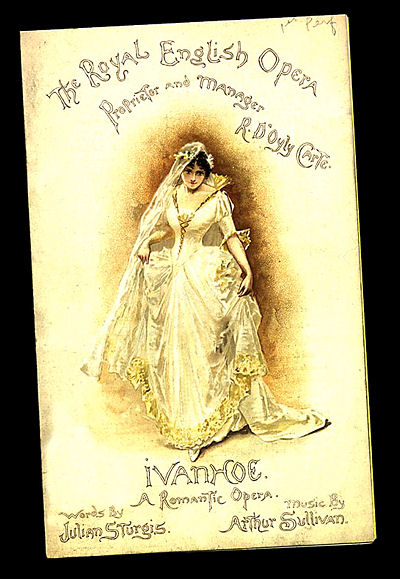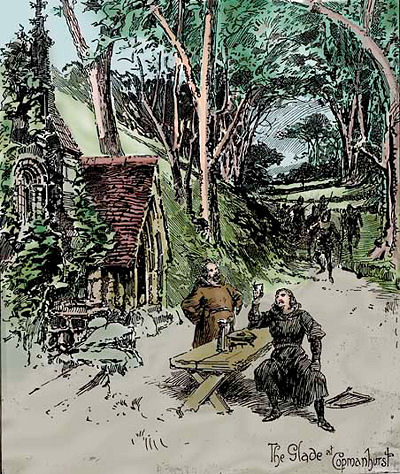
Perhaps it is amazing that we have had to wait so long for the
first professional recording of Sullivan’s only grand opera. All
the more so wen it played for 155 consecutive performances in
1891 and later went touring with the Carl Rosa Opera Company.
The English Opera House was built expressly for it and yet this
facet of British heritage has been neglected and largely forgotten
until now. We have to thank the Sir Arthur Sullivan Society’s
sponsors for making this expensive recording possible and Chandos
for taking the initiative to mount such a worthwhile production.
The legendary Ivanhoe came to us from the Waverley novels of Sir
Walter Scott in 1819. It was such a great favourite in Victorian
times that its appearance in the theatre was certain. There have
been two previous amateur recordings on disc (Pearl) and these
appeared in 1974 and 1989; the first a live performance by Michael
Thomas and a studio one by the Prince Consort. Although the latter
gave a better chance of evaluating Sullivan’s score, there were
nuances, themes and textures that now shine and provide a different
perspective. David Lloyd-Jones must be congratulated for the energetic
pace he sets, never rushed but always advancing in a purposeful
way. This has made all the difference to the way this kind of
recording is perceived.
In the first scene, Sturgis the librettist, has to introduce the
characters and background before the plot can develop. Consequently
the score’s opening section contains much extended recitative
that cannot fully reveal Sullivan’s skill as a composer. We are
being introduced to motifs which cleverly weave in and out of
the work, sometimes later appearing quite subtly. From Act II
onwards both the action and music warms up to powerful crescendos
that excite the emotions and varied means of expression. Bright
brass fanfares give a true air of pageantry.
The singers provide a polished performance, sing superbly and
support each other admirably. Special mention should be made of
Janice Watson with sincerity of portrayal and effortless top notes;
Toby Spence with his strength of delivery and powerful presence;
and Peter Rose for warmth of tone and clear diction. In Janice
and Toby’s Act 1 Scene 2 lyrical duet, the balance is superb.
The chorus is fine and adds considerable weight to the opera.
What has made all the difference in this recording is the impact
that is added by the meaningful phrasing of the vocal lines and
absence of bland characterisation. The passages in Act I Scene
1 make more sense in expert hands and one can now understand the
effects Sullivan was striving to achieve in his score.
Generally, I like the fact that the orchestra is quite forward
to allow all layers of orchestration to come across and yet does
not unduly mask the singers. However, in the second and third
CDs there are times where there seems to be a different balance
with the orchestra - more recessed - and sometimes the first and
second violins are nearly lost. This said, it does not detract
from one’s enjoyment.
Two excellent booklet essays by William Parry and Martin Yates
unveil the fascinating background of the Victorian English Opera
movement and provide an analysis of Sullivan’s score to help give
a wider understanding to the music. I notice that a BBC R3 logo
is shown, and this cheers me. For too long the establishment has
turned its back on the rich scores of 19th century British composers.
Ivanhoe should have been a central work to the 2000 Proms
when Sullivan’s centenary took place. We owe it to musicians like
Sir Charles Mackerras, Ronald Corp and David Lloyd-Jones to remind
us of our previous loss in this genre.
When this recording was planned it was to have been conducted
by Richard Hickox who sadly died a year before the recording was
to take place and to whom it is dedicated. Thankfully, David Lloyd-Jones
picked up the baton and has made an excellent job of providing
an interpretation that is sure to please the harshest of critics.
The English Opera House that premiered Ivanhoe still stands,
now the Palace Theatre in Cambridge Circus and owned by Andrew
Lloyd Webber. I was surprised to see neither his name nor that
of the Arts Council heading the subscription lists: this is the
sort of venture they should surely be promoting.
Raymond J Walker

Complete tracklisting
Ivanhoe (1890-91)
Adapted from Sir Walter Scott's novel A Romantic Opera in Three
Acts Words by Julian Sturgis
CD 1
Act I
Scene 1. Cedric's Hall at Rotherwood 24:27
1 Introduction - 0:57
2 Cedric: 'Each day this realm of England faints and fails' -
2:35
with Men
3 Isaac: 'Good Thane, most noble Thane, I pray…' - 2:21
with Men, Cedric, Squire
4 Cedric: 'Welcome, Sir Knights!' - 5:17
with de Bracy, Brian, Isaac, Women, Men, Rowena
5 Cedric: 'Drink, drink ye all…' - 3:46
with Men, de Bracy, Brian, Rowena, Ivanhoe
6 Men: 'The Palmer! The holy Palmer!'- 7:27
with Ivanhoe, Cedric, Brian, Rowena, de Bracy
7 De Bracy: 'Is she not fair? And she is rich withal' 2:01
with Brian, Men
Scene 2. An Ante-room in Rotherwood 14:09
8 Rowena: 'O moon, art thou clad in silver mail…' - 4:30
9 Rowena: 'Good Palmer, thou dist speak of one I knew…' - 6:05
with Ivanhoe
10 Ivanhoe: 'Like mountain lark my spirit upward springs' 3:34
with Isaac
Scene 3. The Lists at Ashby 20:09
11 Sopranos: 'Will there be no more fighting?' - 3:52
with Chorus, Friar, King
12 Chorus: 'Plantagenesta!' - 3:06
13 Prince John: 'Isaac, my Jew, my purse of Gold' - 3:07
with Cedric, de Bracy, Rebecca
14 Prince John: ''Tis from our Royal brother, Louis of France'
- 3:30
with Heralds, Crowd
15 Sopranos: 'What means his motto?' 6:32
with Crowd, Friar, Locksley, Prince John, Rowena, Cedric
59:01
CD 2
Act II
Scene 1. The Forest, Copmanhurst 19:26
1 King: 'Strange lodging this for England's King' - 5:52
with Friar
2 King: 'There is a custom in the East' - 2:30
with Friar
3 King: 'I ask not wealth nor courtier's praise' - 3:03
4 Friar: 'Not bad, say I, not badly sung!' - 1:12
with King
5 Friar: 'The wind blows cold across the moor' - 3:01
with Outlaws
6 Friar: 'And now for combat! Where's this friend of mine?' 3:45
with King, Lockley, Chorus
Scene 2: A Pasage-way in Torquilstone 9:55
7 Cedric: 'Will not our captor dare to show his face?' - 5:48
with de Bracy, Rowena
8 De Bracy, 'Welcome, Sir Templar! But I may not stay' - 1:07
with Brian
9 Brian: 'Her southern splendour, like the Syrian Moon' 2:59
Scene 3. A Turret-chamber in Torquilstone 22:33
10 Ulrica: 'Whet the keen axes' - 7:26
with Rebecca
11 Rebecca: 'O awful depth below the castle wall!' - 1:06
12 Rebecca: 'Lord of our chosen race' - 3:16
13 Rebecca: 'Take thou these jewels; here is wealth enow…' - 7:55
with Brian
14 Rebeccca: 'What sound is that?' 2:48
with Brian
52:08
CD 3
Act III
Scene 1. A Room in Torquilstone 21:04
1 Ivanhoe: 'Happy with winged feet' - 5:33
2 Ulrica: 'Tend thou the Knight thou lovest' - 1:16
with Rebecca
3 Rebecca: 'Ah, would that thou and I might lead our sheep…' -
3:51
with Ivanhoe
4 Ivanhoe: 'But hark! what sound is in mine ear?' - 1:48
with Rebecca
5 Rebecca: 'I see them now; the dark wood moves with bows' - 2:57
with Tenors, Basses, Ivanhoe
6 Ivanhoe: 'How canst thou know what pain it is to lie…' 5:38
with Rebecca, Soldiers, Brian, Outlaws, Ulrica, All
Scene 2. In the Forest 16:50
7 Outlaws: 'Light foot upon the dancing green' - 4:16
with King, Ivanhoe
8 King: 'Maurice de Bracy, faithless knight' - 2:27
with de Bracy
9 King: 'Look, where thy moody father walks apart' - 5:29
with Ivanhoe, Cedric, Rowena
10 Ivanhoe: 'How oft beneath the far-off Syrian Skies…' - 2:29
with Rowena
11 Isaac: 'Knight, Knight of Ivanhoe, I come for thee!' 2:09
with Ivanhoe, Rowena
Scene 3. At Templestowe 16:13
12 Templars: 'Fremuere principes' - 3:06
13 Grand Master: 'Thou Jewish girl, who art condemned to die…'
- 4:03
with Rebecca
14 Brian: 'It shall not be' - 2:33
with Grand Master, Rebecca
15 Voices: 'A champion! A champion! A champion!' - 1:51
with Ivanhoe, Chorus, Rebecca, Brian
16 Chorus: 'A judgment! A judgment!' - 2:30
with King, Grand Master, Templars
17 King: 'See where the banner of England floats afar…' 2:09
with Templars, Rebecca, Rowena, Ivanhoe, Cedric, All
54:24
Dedication: To the late Richard Hickox who took the enthusiastic
initiative to record Sir Arthur Sullivan's Ivanhoe and in whose
memory this project has now been brought to completion by his
friends.

